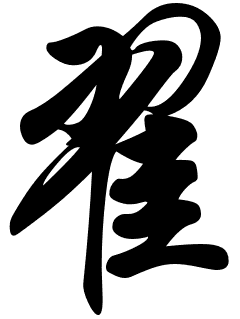
Bing is the Mandarin pinyin romanization of the Chinese surname written 邴 in Chinese character. It is romanized Ping in Wade–Giles. Bing is listed 214th in the Song dynasty classic text Hundred Family Surnames. It is not among the 300 most common surnames in China.

Lì is the pinyin romanization of the Chinese surname written 厲 in traditional character and 厉 in simplified character. It is also spelled Lai according to the Cantonese pronunciation. It is listed 247th in the Song Dynasty classic text Hundred Family Surnames.

Jī is the Mandarin pinyin romanization of the Chinese surname written 嵇 in Chinese characters. It is romanized as Chi in Wade–Giles and Kai or Gai in Cantonese. Ji is listed 194th in the Song dynasty classic Hundred Family Surnames. Relatively uncommon, it is not among the top 300 surnames in China.

Jǐ is the Mandarin pinyin romanization of the Chinese surname written 纪 in simplified Chinese and 紀 in traditional Chinese. It is romanized as Chi in Wade–Giles, and Kei in Cantonese. Ji is the 136th most common surname in China, with a population of 1.1 million. It is listed 122nd in the Song dynasty classic text Hundred Family Surnames.

Jì is the Mandarin pinyin romanization of the Chinese surname written 暨 in Chinese character. It is romanized as Chi in Wade–Giles and Kei in Cantonese. Ji is listed 345th in the Song dynasty classic text Hundred Family Surnames. It is not among the 300 most common surnames in China.

Jí is the Mandarin pinyin romanization of the Chinese surname written 籍 in Chinese character. It is romanized as Chi in Wade–Giles, and Zik in Cantonese. Ji is listed 275th in the Song dynasty classic text Hundred Family Surnames. It is not among the 300 most common surnames in China.

Jí is the Mandarin pinyin romanization of the Chinese surname written 吉 in Chinese character. It is romanized as Chi in Wade–Giles, and Gat in Cantonese. Ji is the 195th most common surname in China, with a population of 490,000. It is listed 190th in the Song dynasty classic text Hundred Family Surnames.

Jì is the Mandarin pinyin romanization of the Chinese surname written 冀 in Chinese character. It is romanized as Chi in Wade–Giles, and Kei in Cantonese. Ji is the 294th most common surname in China, with a population of 160,000. It is listed 316th in the Song dynasty classic text Hundred Family Surnames.

Xun is the Mandarin pinyin romanization of the Chinese surname written 荀 in Chinese character. It is romanized Hsün in Wade–Giles. Xun is the 201st surname in the Song dynasty classic text Hundred Family Surnames. It is not among the top 300 most common Chinese surnames.

Zhai is the Mandarin pinyin romanization of the Chinese surname written 翟 in Chinese character. It is romanized Chai in Wade–Giles, and Chak in Cantonese. It is listed 292nd in the Song dynasty classic text Hundred Family Surnames. As of 2008, it is the 120th most common surname in China, shared by 1.4 million people.

Zu is the Mandarin pinyin romanization of the Chinese surname written 祖 in Chinese character. It is romanized Tsu in Wade–Giles. It is listed 249th in the Song dynasty classic text Hundred Family Surnames. It is not among the 300 most common surnames in China.

Zhuo is the Mandarin pinyin romanization of the Chinese surname written 卓 in Chinese character. It is romanized Cho in Wade–Giles, Cheuk in Cantonese, and Toh in Teochew and Hokkien. Zhuo is listed 277th in the Song dynasty classic text Hundred Family Surnames. As of 2008, it is the 224th most common surname in China, shared by 360,000 people.

Ping is the Mandarin pinyin romanization of the Chinese surname written 平 in Chinese character. It is romanized P'ing in Wade–Giles. Ping is listed 95th in the Song dynasty classic text Hundred Family Surnames. It is not among the 300 most common surnames in China.

Ming is the Mandarin pinyin and Wade–Giles romanization of the Chinese surname written 明 in Chinese character. Ming is listed 111th in the Song dynasty classic text Hundred Family Surnames. It is not among the 300 most common surnames in China.

Zang is the Mandarin pinyin romanization of the Chinese surname written 臧 in Chinese character. It is romanized Tsang in Wade–Giles. It is listed 112th in the Song dynasty classic text Hundred Family Surnames. As of 2008, it is the 241st most common surname in China, shared by 310,000 people.

Ru is the Mandarin pinyin romanization of the Chinese surname written 茹 in Chinese character. It is romanized Ju in Wade–Giles, and Yu in Cantonese. Ru is listed 331st in the Song dynasty classic text Hundred Family Surnames. It is not among the 300 most common surnames in China.

Che is the Mandarin pinyin romanization of the Chinese surname written 车 in simplified Chinese and 車 in traditional Chinese. It is listed 229th in the Song dynasty classic text Hundred Family Surnames. As of 2008, it is the 191st most common surname in China, shared by 540,000 people. It is romanized Cha in Korean.

Zha is the Mandarin pinyin romanization of the Chinese surname written 查 in Chinese character. It is romanized as Cha in Wade–Giles. Zha is listed 397th in the Song dynasty classic text Hundred Family Surnames. As of 2008, it is the 176th most common surname in China, shared by 680,000 people.

Geng is the Mandarin pinyin romanization of the Chinese surname written 耿 in Chinese character. It is romanized as Keng in Wade–Giles. Geng is listed 350th in the Song dynasty classic text Hundred Family Surnames. As of 2008, it is the 139th most common surname in China, shared by 990,000 people.
Luan is the Mandarin pinyin and Wade–Giles romanization of the Chinese surname written 栾 in simplified Chinese and 欒 in traditional Chinese. Luan is listed 243rd in the Song dynasty classic text Hundred Family Surnames. As of 2008, it is the 226th most common surname in China, shared by 360,000 people.






















